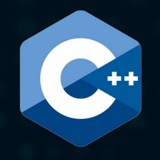What is C++?
📌 C++ is a cross-platform language that can be used to create high-performance applications.
📌 C++ was developed by Bjarne Stroustrup, as an extension to the C language.
📌 C++ gives programmers a high level of control over system resources and memory.
@c_programming_tut
📌 C++ is a cross-platform language that can be used to create high-performance applications.
📌 C++ was developed by Bjarne Stroustrup, as an extension to the C language.
📌 C++ gives programmers a high level of control over system resources and memory.
@c_programming_tut
Why Use C++
📌C++ is one of the world's most popular programming languages.
📌C++ can be found in today's operating systems, Graphical User Interfaces, and embedded systems.
📌C++ is an object-oriented programming language which gives a clear structure to programs and allows code to be reused, lowering development costs.
📌C++ is portable and can be used to develop applications that can be adapted to multiple platforms.
📌C++ is fun and easy to learn!
@c_programming_tut
📌C++ is one of the world's most popular programming languages.
📌C++ can be found in today's operating systems, Graphical User Interfaces, and embedded systems.
📌C++ is an object-oriented programming language which gives a clear structure to programs and allows code to be reused, lowering development costs.
📌C++ is portable and can be used to develop applications that can be adapted to multiple platforms.
📌C++ is fun and easy to learn!
@c_programming_tut
📌C++ Getting Started...
⚙️ To start using C++, you need two things:
🔧A text editor,
like Notepad,
Sublime Text ,
VS code,
to write C++ code
🔧A compiler,
like GCC,
to translate the C++ code into a language that the computer will understand
@c_programming_tut
⚙️ To start using C++, you need two things:
🔧A text editor,
like Notepad,
Sublime Text ,
VS code,
to write C++ code
🔧A compiler,
like GCC,
to translate the C++ code into a language that the computer will understand
@c_programming_tut
📌C++ Install IDE
⚙️An IDE (Integrated Development Environment) is used to edit AND compile the code.
⚙️Popular IDE's include
Code::Blocks,
Eclipse, and
Visual Studio.
These are all free, and they can be used to both edit and debug C++ code.
Note: Web-based IDE's can work as well, but functionality is limited.
⚙️We will use Code::Blocks in our tutorial, which we believe is a good place to start.
📥 You can find the latest version of Codeblocks at
http://www.codeblocks.org/downloads/26
Download the mingw-setup.exe file, which will install the text editor with a compiler.
@c_programming_tut
⚙️An IDE (Integrated Development Environment) is used to edit AND compile the code.
⚙️Popular IDE's include
Code::Blocks,
Eclipse, and
Visual Studio.
These are all free, and they can be used to both edit and debug C++ code.
Note: Web-based IDE's can work as well, but functionality is limited.
⚙️We will use Code::Blocks in our tutorial, which we believe is a good place to start.
📥 You can find the latest version of Codeblocks at
http://www.codeblocks.org/downloads/26
Download the mingw-setup.exe file, which will install the text editor with a compiler.
@c_programming_tut
📌C++ Quickstart
☑️ Let's create our first C++ file.
☑️ Open Codeblocks and go to File > New > Empty File.
☑️ Write the following C++ code and save the file as myfirstprogram.cpp (File > Save File as):
@c_programming_tut
☑️ Let's create our first C++ file.
☑️ Open Codeblocks and go to File > New > Empty File.
☑️ Write the following C++ code and save the file as myfirstprogram.cpp (File > Save File as):
@c_programming_tut
🔖 Don't worry if you don't understand the code above -
we will discuss it in detail in later chapters.
☑️For now, focus on how to run the code.
☑️ Then, go to Build > Build and Run to run (execute) the program.
@c_programming_tut
we will discuss it in detail in later chapters.
☑️For now, focus on how to run the code.
☑️ Then, go to Build > Build and Run to run (execute) the program.
@c_programming_tut
📌 Example explained
☑️ Line 1: #include <iostream> is a header file library that lets us work with input and output objects, such as cout (used in line 5). Header files add functionality to C++ programs.
☑️ Line 2: using namespace std means that we can use names for objects and variables from the standard library.
🔖Don't worry if you don't understand how #include <iostream> and using namespace std works. Just think of it as something that (almost) always appears in your program.
@c_programming_tut
☑️ Line 1: #include <iostream> is a header file library that lets us work with input and output objects, such as cout (used in line 5). Header files add functionality to C++ programs.
☑️ Line 2: using namespace std means that we can use names for objects and variables from the standard library.
🔖Don't worry if you don't understand how #include <iostream> and using namespace std works. Just think of it as something that (almost) always appears in your program.
@c_programming_tut
☑️ Line 3: A blank line. C++ ignores white space.
☑️ Line 4: Another thing that always appear in a C++ program, is int main(). This is called a function. Any code inside its curly brackets {} will be executed.
☑️ Line 5: cout (pronounced "see-out") is an object used together with the insertion operator (<<) to output/print text. In our example it will output "Hello World".
☑️Line 6: return 0 ends the main function.
☑️Line 7: Do not forget to add the closing curly bracket } to actually end the main function.
@c_programming_tut
☑️ Line 4: Another thing that always appear in a C++ program, is int main(). This is called a function. Any code inside its curly brackets {} will be executed.
☑️ Line 5: cout (pronounced "see-out") is an object used together with the insertion operator (<<) to output/print text. In our example it will output "Hello World".
☑️Line 6: return 0 ends the main function.
☑️Line 7: Do not forget to add the closing curly bracket } to actually end the main function.
@c_programming_tut
